Len Evans
In His Own Words
The importance of the life-long contribution of Leonard Paul Evans (Len or LPE to his friends) to the cause of wine can partly be gauged by five letters after his name: AO, OBE. This unfailingly generous, incredibly energetic man spent his wine-life (and his other interests) pursuing excellence, urging others to do the same. He was equally scathing about complacency and mediocrity, which he saw as the greatest danger to the Australian wine industry.
All of these strands, woven together over a 40-year period, came to fruition with the Len Evans Tutorial. Len was not one to boast about any of his innumerable achievements, but we who knew him better than most others, know he regarded the Tutorial as the greatest of them all.
-
“At 71, I had time on my hands. I rang a few friends, to see if they would support a non-profit organisation. The idea was to seek out, each year, twelve gifted palates who could be further trained as show judges. There was to be no distinction between genders, no limit to age as long as trainees would have a useful show life ahead of them, no allocation to states and no preference given to candidates of the sponsors. Obviously we needed sponsors, to accommodate and feed the selected scholars, to pay for the judges’ expense (in the event some never claimed them) and to buy the wines necessary. We needed at least $60,000 and thought this could come from 12 friends in the industry – about $5,000 each.
Amazingly, this was obtained in one morning. A typical phone call – ‘We’re starting a non-profit organisation in an attempt to improve and develop the quality of show judging. I would like you to be a sponsor. Its $5,000 per year’. There was only one refusal – the Wine Federation of Australia. I thought it proper it should be seen to be helping a scheme that could only be in its interests. After initial enthusiasm, it cancelled on the basis that it might establish a precedent. Typical blinded bureaucracy, and you can imagine our scorn.
The original twelve sponsors, many of whom remain to this day, were:
Amorim Cork Australia Pty Ltd, Dandenong South, Victoria
Brokenwood Wines, Hunter Valley, New South Wales
McGuigan Wines, Hunter Valley, New South Wales
Petaluma, Crafers, South Australia
Shaw and Smith Pty Ltd, Balhannah, South Australia
Vintage Cellars, Silverwater, New South Wales
Tyrrells Vineyards, Hunter Valley, New South Wales
Leeuwin Estate, Fremantle, Western Australia
McWilliams Wines, Hunter Valley, New South Wales
Lehmann Wines, Tanunda, South Australia
Tahbilk Pty Ltd, Nagambie, Victoria
Yalumba Wine Company, Angaston, South Australia
After a couple of years, it was obvious we could not run the event without further funds. Our guardian angel was Basil Sellers, an old friend and a partner in Tower Estate, who had wanted to establish a Len Evans Memorial Scholarship. As I have said elsewhere, I thought this rather premature and when he examined the results of the first two tutorials he injected funds for the following ten years; a superb gesture.
The scholarships are awarded after a considerable search and quality program. Wine-makers, sommeliers, industry sales personnel, wine-writers and educators are obvious candidates, though amateurs may be included if they have started to ascend the judging ladder. One for example, Dr Ken Dobler, a very keen and knowledgeable wine lover, started at the Hunter Show as a trainee before becoming an associate and finally a judge. He obtained a scholarship, performed well, was recommended to show committees and has now judged in Sydney and at the National Show.
The scholars each ‘labelled’ with a sponsors name, have a gruelling four-and-a-half day program. In the mornings they judge only 30 wines (Chardonnay, Shiraz, Pinot Noir and Cabernet on various days). The wines represent the best from all over the world. The Pinots, for example, will come from Australia, France, the USA, New Zealand and anywhere else we might find and outstanding example. The French wines from Burgundy will contain DRC’s, de Vogüé and Leroy wines for example, the greatest vintages. All wines are masked. They are judged by the experienced panel, comprising James Halliday, Brian Croser, Iain Riggs, Ian McKenzie – all of whom are, or have been, ‘multi’- chairmen- Geoffrey Grosset, Gary Steel and myself – while the scholars do the same. The panel generally finishes first, collates its points and then every scholar has to justify his or her points per wine. Some lively discussions ensue, and that is why it takes three hours to do 30 wines. In the afternoon there are masterclasses and in the evenings each dinner has brackets of great wine served masked with emphasis on identification of quality rather than that of area and label. The week concludes with a tasting of the range of wines from Domaine de la Romanée Conti.
Quite simply, the idea is to further develop the wine-judging skills of the scholars, and by showing them the greatest wines in the world, encourage them to aspire to the development and support of such greatness in Australia. People overseas may not realise that we tend to keep our best wines to ourselves, especially those of small makers. We need to have a much greater culture of site, varietal and clonal selection to do better than we are.
The tutorial has exceeded whatever success we may have anticipated. Last year over 130 placements were made by scholars. In 2001, almost 50 per cent of judges and associates of the three major shows, Canberra, Sydney and Adelaide were tutorial scholars. In Sydney, five of the twelve judges and all of the twelve associates were scholars. Brian Croser called it ‘the bright new face of judging in Australia’.
What is most pleasing to me is the discovery of such a well of talent, obsession, knowledge, thirst (for more knowledge) and passion for quality. At the first tutorial I said, rather patronisingly, ‘Though we expect to teach you, I’m sure we will learn a great deal from you’.
How prophetic my words were. How good most of them are. If these people represent the future of the industry, then Australia will develop even further as a great wine nation”.
Len Evans, 2006
From “Not My Memoirs” pub. 2012
For more from Len Evans, visit www.lenevans.com.au to buy his books How To Taste Wine and Not My Memoirs or look for ebooks on Amazon.
The Unique Len Evans
By Huon Hooke
The night before Len Evans died, he’d had the kind of dinner he probably would have liked as his last on this earth. The company of close friends and plenty of great bottles. Those friends included wine writer James Halliday, Brokenwood winemaker Iain Riggs and his partner Sally Margan, English wine writer Jancis Robinson and her husband Nick Lander, Hunter winemaker Brian McGuigan and UK friends the Hendersons, at his Hunter Valley home Loggerheads.
-
His daughter Jodie cooked, as Len’s wife Trish was in hospital having a biopsy. Halliday and Robinson were in the region for the Hunter Valley Wine Show, which they and Riggs had judged on the preceding three days. For once, and somewhat unusually, Evans served only old Australian wines with dinner, finishing with an 1890 Chambers Rutherglen Muscat.
Evans died the following morning, August 17. He was aged 75. He had just arrived at the John Hunter Hospital in Newcastle to pick up Trish and take her home. But he died of a heart attack in his car in the car park.
Evans was born on August 31, 1930, in Felixstowe, England, and arrived in Australia via New Zealand in 1955. The 1930 vintage was not an auspicious one for wine, so last year, suspecting that the ailing Evans did not have many birthdays left, his friends organised a “conception year” wine theme for his 75th birthday dinner in the Hunter – the ‘29s being from a great vintage, at least in France. By all accounts, the wines were extraordinary and Evans was thrilled.
Evans earned the epithets Australia’s Mr Wine, and the Godfather of Australian Wine—both thoroughly deserved. For it was he who almost single-handedly persuaded Australians to forsake sweet fortified wines in the 1960s (when he ran the Australian Wine Bureau) and start enjoying dry red and white table wines. This kick-started what became known as the ‘wine boom’ and Aussie wine never looked back.
I last saw him on June 29 at a dinner hosted by Piedmont’s Mr Wine, Angelo Gaja. Evans looked pale and frail. He’d had major heart trouble for the last few years and it took a big event to get him down to Sydney from the Hunter. A car would be sent: Evans had ceased to drive himself such distances. But the word more recently had been good: Evans had had a new pacemaker fitted and was looking well again. Hence his sudden death carried an extra shock factor for his friends.
Most of these friends, however, would secretly admit to being amazed that Evans had lived so long, such was his pace of life, his neglect for his health, and his capacity for great wine and food. Regular indulgent trips to France would result in a weight gain and resultant talking-to from his GP which, I suspect, would be cheerfully ignored by the patient. When I came to Sydney in 1982 Evans had already had his first heart attack and his health was an open subject. That he lived his full-tilt life for another 24 years is testament to the will and spirit of this phenomenal man.
I will remember Len Evans as a charismatic man, a great talker, a raconteur, singer and joke-teller; an entertainer, who hated pomposity in wine-talk and much preferred to chat about golf or art, antiques or collectables – he was an antique dealer and pewter collector among other things.
A man of many parts, Evans was an expert golfer and one-time pro; a sculptor (traditional hammer and chisel on stone), an inveterate builder (think of the award-winning design of The Rothbury Estate, aka ‘the Pokolbin Opera House’; Tower Estate; Tower Lodge, and Loggerheads—his own wonderfully eccentric rammed-earth house on a hill overlooking Pokolbin). And, like all Welshmen, he had a great voice and loved to sing.
He was an extraordinarily generous host and provider of great bottles of wine, who believed in educating the younger generations. Judges and associates at the Sydney Royal Wine Show were astonished at the staggering array of great wines he opened (and inspired or bullied others into bringing) at judging week dinners, during his long tenure as chairman.
I well remember those dinners in the tower at Bilson’s (later Quay): once, ten red wines were laid out in two rows of five before each person, and he asked a single question – what is the theme? After much educated and not-so-educated guessing, they turned out to be all five of the Bordeaux first growths, from two great vintages: 1982 and 1970. Our task was to pick the chateaux and then match them to the vintages.
He enthused and inspired many, earned untold sums of money for charities, and communicated the pleasure of wine to us all.
Evans’s great mission to train up younger wine professionals culminated in his annual Len Evans Tutorial—a keenly-sought scholarship for 12 hand-picked people in the Hunter every year. It will continue even without the man himself.
For many of us, our intro to Evans was when he ran Len Evans Wines at Bulletin Place, which was a heritage building filled with winey bric-a-brac and memorabilia: two restaurants on separate floors and a basement wine shop. It was, simply, a paradise for wine lovers. The number of lay drinkers who were converted to wine, lovers who began their affairs, and future wine professionals who cut their teeth at Bulletin Place is legion. It closed in 1990 and Sydney has never succeeded in filling the void.
From the ‘60s to the ‘80s Evans was also a prolific writer, whose Indulgence column in The Australian (and before that, Cellarmaster in ‘The Bulletin’) was full of fun and did not always have a lot to do with wine. I will always cherish The Evans Theory of Capacity, in which he stated that at least 10% of your income must be spent on wine, and also, that you should never drink bad wine because you only have the capacity to drink so many bottles in a lifetime, and therefore every bad bottle you drink is like smashing a good bottle against a brick wall.
For all his down-to-earth claims that “wine is just a drink”, Evans was always focused on quality. He never tired of exhorting the wine industry to do better, to shake off its complacency, to produce more great wines, and never be satisfied with itself.
In the late ‘70s, Evans attempted to create the first-ever multi-national fine wine company. He had started Rothbury with Murray Tyrrell in the late ‘60s, and with his backer Peter Fox began the Evans Wine Company.
For a short time, it owned Château Rahoul in Bordeaux’s Graves region, Château Padouen in Sauternes, and was aiming to buy properties in the Napa Valley and elsewhere. But Fox died in a car smash in 1981 and the dream fell apart. Nevertheless, with Brian Croser and others, Evans was involved in creating Petaluma and chaired its board from foundation. Rothbury itself fell victim to a hostile takeover by Mildara Blass in 1996.
Evans’s genius was that he attracted wealthy backers to finance his wonderful, ambitious, inspired fantasies. It was a time when wealthy people were happy to finance projects that they believed in, with no expectation of dividends (expectations which were usually fulfilled!). They were thrilled to be involved with anything that held them in Evans’ magnetic orbit. Some marvellous things were achieved. At the very minimum, a great deal of fun was had. Sadly, it seems to be an era that has passed.
The memory of Len Evans, though, is unlikely to ever pass. He enthused and inspired many, earned untold sums of money for charities, and communicated the pleasure of wine to us all. A great man and a great life, lived to the limit.
Huon Hooke
Published with permission from The Real Review
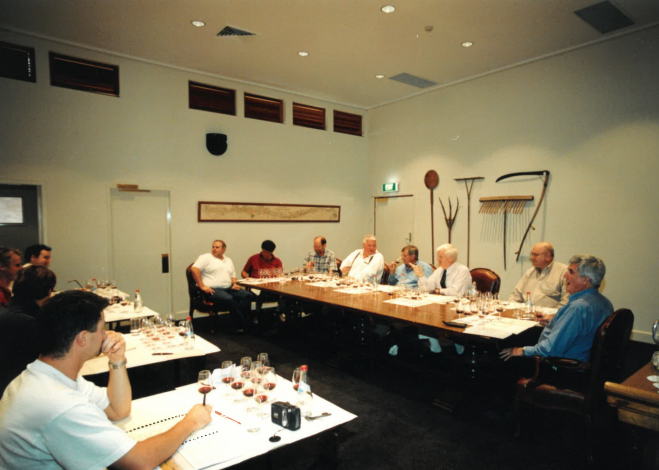
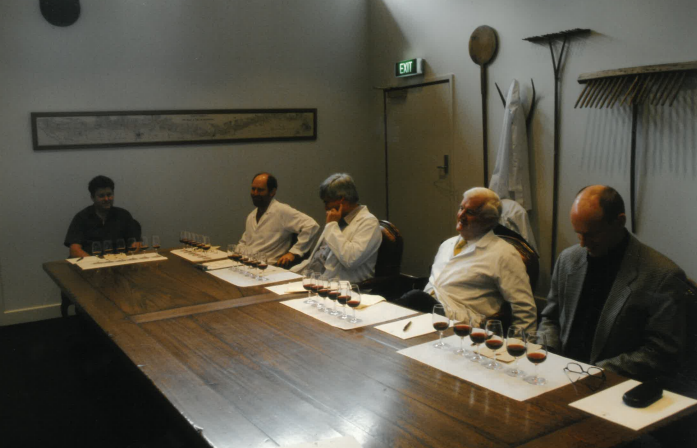


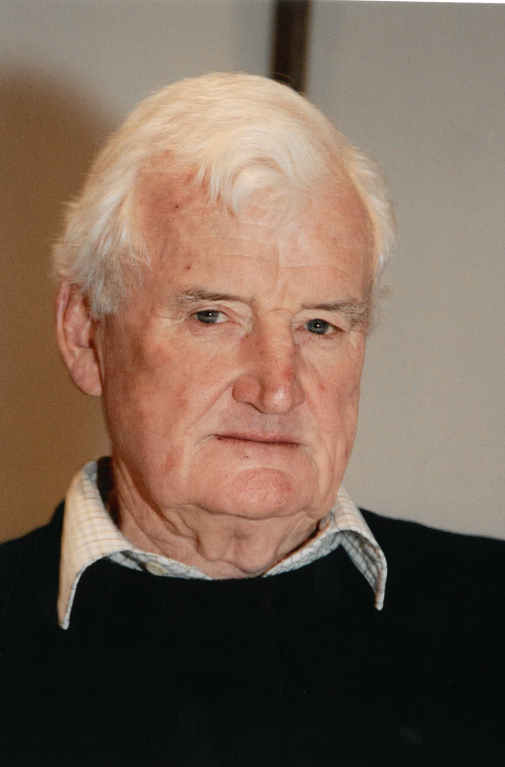
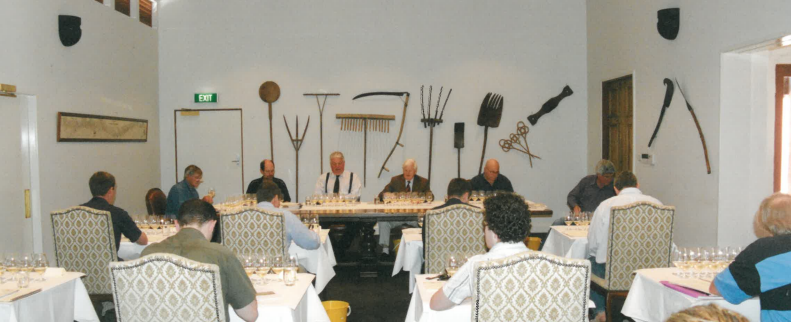
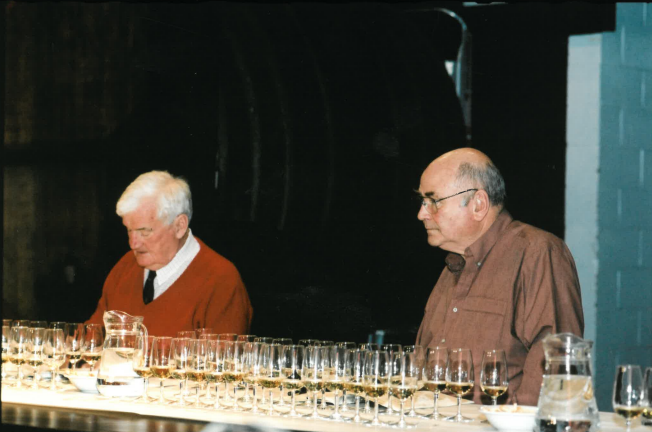
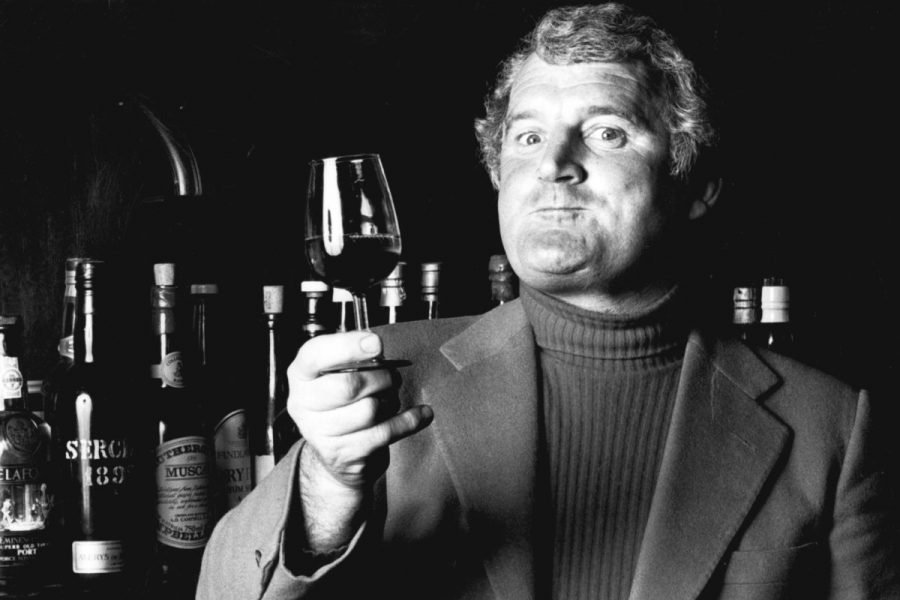
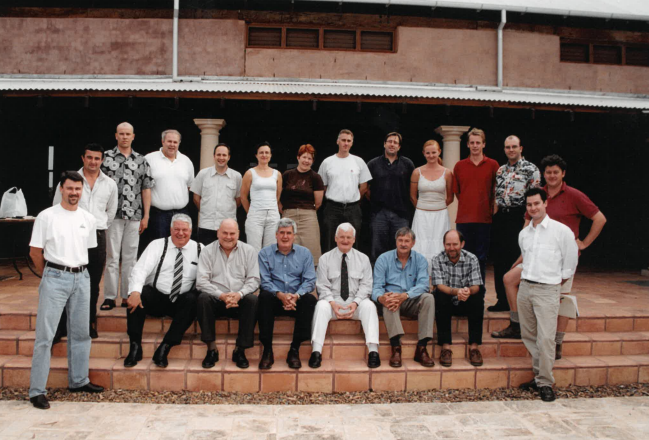
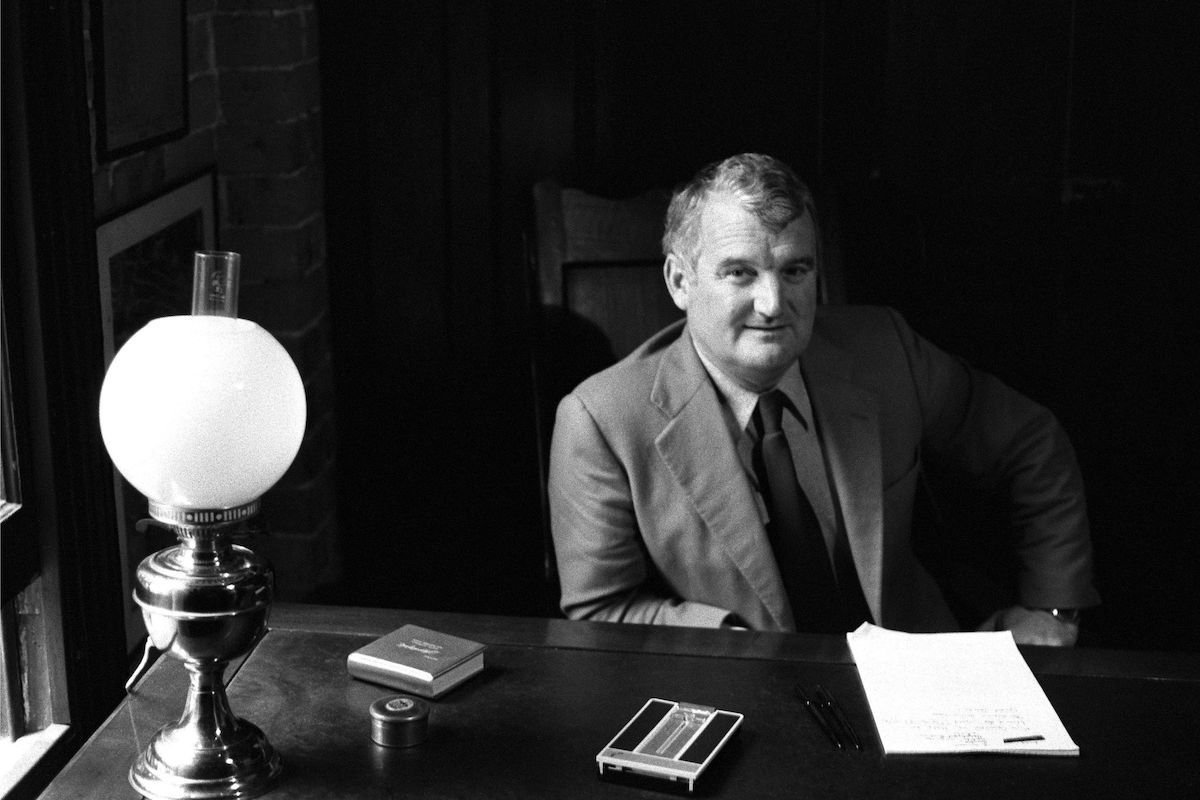
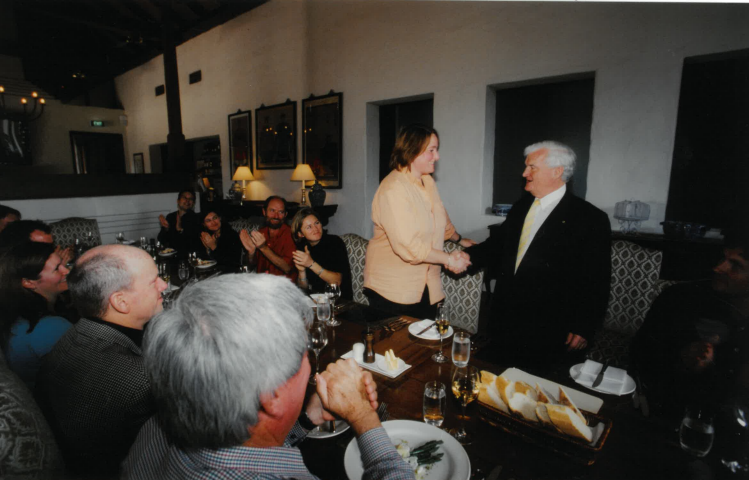
A Friendship in Wine
By James Halliday AM
I have written at length about my 35-year friendship with Len Evans in my memoir ‘A Life in Wine’. It began in the late 1960s and grew ever stronger, month-by-month, year-by-year. A love of great wine (especially Domaine de la Romanée-Conti) was the glue, but it ranged over many things: seven card stud poker, flyfishing, cricket, rugby union, and many items of current debate.
-
Until his death, we were the only two people who had attended every Single Bottle Club Dinner, simply because we were the two architects of it, and jointly decided the date it would be held each year (twice a year for a brief spell in the 1980s).
It is a matter of public record that he was the greatest and most effective supporter of the Australian wine industry throughout his life, an OBE and AO small recognition of the extent of that contribution. His Bulletin Place wine shop and restaurants, his creation of the Rothbury Estate and, later, of Tower Estate and Tower Lodge, and his contribution to the Australian wine show system, were but some of his achievements. He raised large amounts at charity dinners, able to shame or outwit those who he thought should be bidding for lots at auctions.
But his strongest belief was that Australian winemakers – and, in the case of large producers, their corporate bosses – were too complacent. He was the driving force that led to the 30-year vision in 1995, articulating a path towards a $4.5 billion industry. It had its supporters, but also its critics – who were silenced when the vision was realised in 2001, 24 years early.
I know with absolute certainty that he believed his greatest achievement was the establishment of the Len Evans Tutorial. Its aims were simply: to select 12 men and women each year who, over five days, would be exposed to the great wines of Australia and the world; whose complacency would be shattered, or, at least, seriously challenged; and to find which of the 12 had the superior palate and the most rounded understanding of what it is that makes great wines great.
The Tutorial Board
The Board of Len Evans Tutorial Incorporated and Len Evans Foundation Ltd is made up of the following members who offer their time and expertise on a voluntary basis.
Sally Evans
CHAIR
Sarah Crowe
DEPUTY CHAIR
Iain Riggs AM
Sam Connew
Michael Hill-Smith AM MW
Tom Carson










